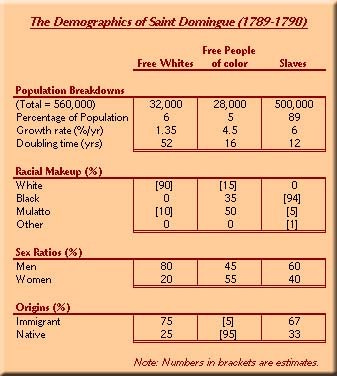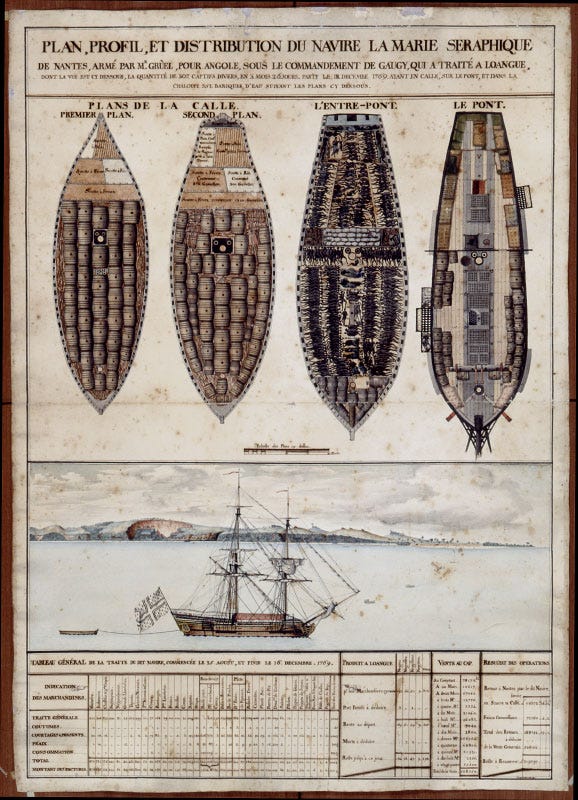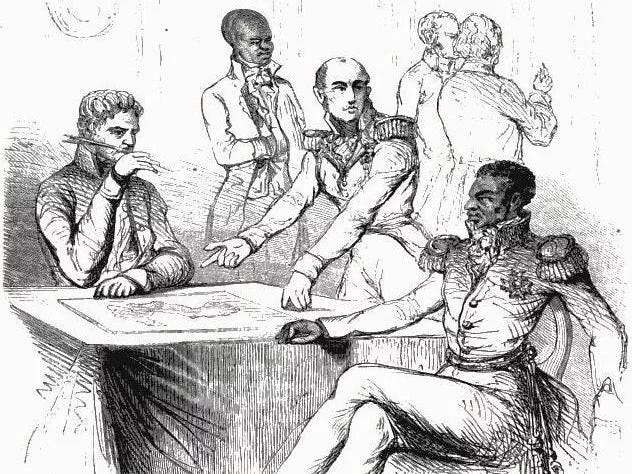Haiti: Reverse Reparations
The State of Haiti if Reparations were not paid to Slave owners
Whenever someone suggests paying reparations to descendants of slaves, we get the familiar tone. People turn on their inner Bill O’Reilly and claim that descendants of slaves need to get over slavery. The systematic oppression in every level throughout history is completely ignored and it is met with familiar outrage. However, a few times in history, slave-owners have been paid reparations for their loss of property. None so damaging and affecting current situation as in the case of Haiti.
As Haiti faces yet another crisis and meddling in the form of UN-peace keeping troops led by Kenya,they are given full support by the traditional imperial powers: USA and France. In fact, in early June, French President Emmanuel Macron met with Kenyan President William Ruto. In the meeting, the French President affirmed his support for the "Kenyan-led" "peacekeeping" mission to Haiti in order to quell the unrest.
Haiti’s major problems are lack of infrastructure, extreme poverty, food insecurity and extreme wealth disparity. None of which, a violent crackdown by one of the world’s most corrupt police forces would fix.
Earlier this year, we interviewed documentary filmmaker Kim Ives about the situation in Haiti. He says that the US media is completely misrepresenting the entire situation.
Watch the interview here:
Because of heavy foreign influence and neoliberalism, Haiti has been put into the debt trap. Severe austerity has caused the state apparatus to not function. Many citizens have banded together in neighborhood associations as a form of self-help.
Kim Ives said, “the narrative about the gang violence in Haiti is an imperialist narrative to demonize and criminalize any resistance…many of the “gangs” are mislabeled. “
Kim Ives continued, “ [they] are fundamentally neighborhood committees [that originated] with the debilitation of the state due to neoliberal reforms that began in earnest in 1986… The neighborhood committees became, in fact, the State in many neighborhoods of the city [capital Port-au-Prince], especially as it began to mushroom as peasants were driven off the land by these same neoliberal reforms.”
In other words, Haiti's main problems stem from imperial interference and colonial theft, the same problems they have had since their inception. France played a historical role as the biggest beneficiary of the looting of Haiti. Instead of supporting a violent invasion to install a leader chosen by Western powers in a secret backroom without the input of a single Haitian, perhaps the best way to improve the situation in Haiti is to pay restitution for their most significant ill-gotten gains.
Haiti, known as Saint Dominigue, back then, began its life as one of the most lucrative colonies for France. The island produced half of all the coffee in the world and 40% of the world's sugar in the 1790s. The labor required to get process sugar and coffee is intensive and grueling. In order to fulfill these requirements, France shipped 40,000 slaves through the grueling middle passage, which was the voyage between Africa to the Americas for enslaved people. Because of the cramped conditions, and lack of nutrition, 15% of the enslaved people died during the middle passage.
Saint Dominigue was the primary destination for many of these people. During the late 1700s, one third of all the people transported on the middle passage ended up in Saint Dominique.
The conditions were brutal. Abuse was routine. Often the most minor transgressions resulted in severe beatings. Women were subjected to sexual abuse. Working conditions were long, under unwavering heat. The food was limited, as well as access to clean water. The living conditions were cramped, which made the island ripe for epidemics. Consequently The average life expectancy for an enslaved person on the island of Saint Dominique was only 21.
The trade from Saint Dominique was very profitable for France. The yearly profits from the enslaved labor reached more than 150 Livres on average.
Inspired by the activities of the French Revolution, and also looking to get out of the miserable conditions on the Plantations, in 1792, led by Touissant L’Overture, the slaves took up arms and formed a rebellion.
Fighting this rebellion was not easy, as the tiny island had to fight four colonial powers at once:English, French, Spain and the USA. After amazing maneuvers, and nearly 12 years of fighting , Saint Dominique finally achieved independence.
On January 1, 1804, Jean Jacques Dessalines declared the island known as "Santo Domingo" independent. The name was changed to Haiti, which means "Island of the high mountains" in the local indigenous languages. Despite losing official control of the Island in 1804, France would continue to claim the island as part of its own until 1825.
Sadly, the 12 years of war ravaged the countryside, and limited Haiti's ability to produce their lucrative cash crops. This was not the end to their troubles.
On July 3,1825, France sent 14 ships armed with 528 cannons to the harbor in Port-au-prince and threatened the island with complete military annihilation. France demanded Haiti pay 150 million Francs in reparations to the slaveowners who had ”lost their property” to the Haitian rebellion. Haiti reluctantly submitted to the demand and France officially recognized Haiti as an independent country.
To understand the scale of this debt, the average revenue that Haiti received from its main exports between 1818-1824 was 2,581,210 francs. Therefore, 150 million francs represented 58 years of revenue at 100% going to France.1
According to Edward Galeano:
“In 1804, they inherited a land ravaged by the devastating sugar cane plantations and a country ravaged by a ferocious war. They inherited “the French Debt”. France resented deeply the humiliation inflicted on Napoleon Bonaparte. Soon after its birth, Haiti had to agree to deliver huge Gal reparations, through which they were forced to pay for their own liberation. That atonement for the sin of freedom would cost 150 million gold francs. The new country was born strangled by this rope tied to its neck: a fortune that is equal to Haiti paid French slaveholders and their descendants the equivalent of between $20 and $30 billion in today's dollars. It took Haiti 122 years to pay it off. Professor Marlene Daut writes it "severely damaged the newly independent country's ability to prosper." in today’s currency, or 44 times the total budget of Haiti today. It took far longer than a century to repay the debt and the hefty interests. In 1938 the final debt was paid. By then Haiti belonged to the US banks” (Eduardo Galeano, La Maldición Blanca, 2004).
To understand how much the French debt to Haiti impoverished Haiti, in the paper The Odious Debt, the scholars imagine the existence of a sovereign wealth fund where Haiti would deposit the debt it owed to France. These scholars look at different instruments that Haiti could have invested this money into and the rate of return. The lowest end of the estimates is based on the assumption that Haiti would have invested the sovereign wealth fund in purely gold reserves, and the sovereign fund would be equivalent to $1.6 billion, or 12% of Haiti’s GDP. A middle-of-the-road estimate would be to assume that the real rate of return would be 1% which would yield 2.9 billion. This middle figure would increase the GDP per capita of Haiti to $8100, significantly improving the lives of the impoverished Haitians.
Over the years, many people have called upon France to repay the “greatest heist of all time” back to Haiti. Each time it has been met with derision and eye-rolls from the French leadership.
Instead, of supporting a peacekeeping mission which will create more violence in Haiti, if France really wanted to help bring stability, paying back their ill-begotten wealth to Haiti maybe the best way to ensure stability.
Oosterlinck, Kim, Ugo Panizza, W. Mark C. Weidemaier, and Mitu Gulati. n.d. “A debt of dishonor.” Carolina Law Scholarship Repository. https://scholarship.law.unc.edu/faculty_publications/652/.







A few years ago a French man I used to know mentioned the Haitian reparations, and could only see it as a reasonable compensation for the French people killed in the uprising (no sympathy for the preceding years of slavery).
Fast forward a couple of years, and his attitude to the Donbass was that by declaring independence, they had left Ukraine with no choice but to launch the ATO. We don't hang out any more.
Astonishing history. Thank you.